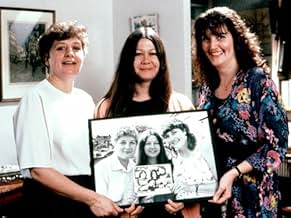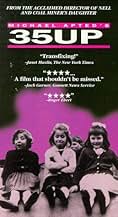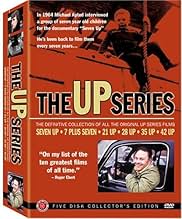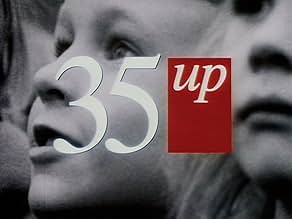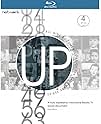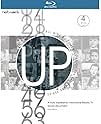35 Up
- TV Movie
- 1991
- 2h 3m
IMDb RATING
8.0/10
2.9K
YOUR RATING
Director Michael Apted interviews the same group of British-born adults after a seven-year wait as to the changes that have occurred in their lives during the last seven years.Director Michael Apted interviews the same group of British-born adults after a seven-year wait as to the changes that have occurred in their lives during the last seven years.Director Michael Apted interviews the same group of British-born adults after a seven-year wait as to the changes that have occurred in their lives during the last seven years.
- Won 1 BAFTA Award
- 1 win & 2 nominations total
Bruce Balden
- Self
- (as Bruce)
Jacqueline Bassett
- Self
- (as Jackie)
Symon Basterfield
- Self
- (archive footage)
- (as Symon)
Andrew Brackfield
- Self
- (as Andrew)
John Brisby
- Self
- (as John)
Suzanne Dewey
- Self
- (as Suzy)
Charles Furneaux
- Self
- (archive footage)
- (as Charles)
Nicholas Hitchon
- Self
- (as Nick)
Neil Hughes
- Self
- (as Neil)
Lynn Johnson
- Self
- (as Lynn)
Paul Kligerman
- Self
- (as Paul)
Susan Sullivan
- Self
- (as Sue)
Tony Walker
- Self
- (as Tony)
Michael Apted
- Interviewer
- (voice)
- (uncredited)
Peter Davies
- Self (ages 7, 14)
- (archive footage)
- (uncredited)
- Director
- Writer
- All cast & crew
- Production, box office & more at IMDbPro
Featured reviews
Director Michael Apted revisits his kids once again 7 years later. They are 35 now and they continue to surprise.
Some of them face the deaths of their parents. In the case of Paul, he's reconnecting with his father. There is more reflection now that they're in the middle age area. They aren't kids anymore.
The biggest disappointment has to be the missing participants. Charles continues to not participate. And now Peter and Simon are gone. Certainly we want at least an update. The most heart warming part has to be Neil. The fact that he isn't dead in the middle of nowhere is a big victory.
Some of them face the deaths of their parents. In the case of Paul, he's reconnecting with his father. There is more reflection now that they're in the middle age area. They aren't kids anymore.
The biggest disappointment has to be the missing participants. Charles continues to not participate. And now Peter and Simon are gone. Certainly we want at least an update. The most heart warming part has to be Neil. The fact that he isn't dead in the middle of nowhere is a big victory.
10Ed-90
Fascinating longitudinal study of the changes in people over time. My college students were so engrossed several asked to borrow my copy to watch again at home. Can't wait for "42 Up" to come out in video. I recommend this film for anyone who likes to think about what they've viewed, and anyone interested in the power of class differences.
The fifth chapter in the ongoing seven-year cycle of documentaries catches up with all but two of the original kids, after following their development from childhood through repressed adolescence to (mostly) hopeful young adulthood, and here to a more or less stable maturity. The changes in the past seven years are less dramatic than those revealed in '28 Up', but with each new installment the series grows more rich and provocative, and seeing the latest episode is like visiting old friends.
Some of the stories have taken surprising turns: the upper class snobbery of Andrew and John (who refused to appear in the previous film) has mellowed with age. Destitute Neil is doing community theater in the Shetland Islands. And the trio of friends (Jackie, Lynn and Sue), whose lives were the least interesting seven years earlier now each deserve their own separate film (one of them is suffering, with bitterness, from an obscure neurological disorder). Director Michael Apted's socio-political assumptions have long since fallen by the wayside; the series might have started as an experiment in social upbringing with an eye on class distinctions, but if anything the films prove that time is the great equalizer.
Some of the stories have taken surprising turns: the upper class snobbery of Andrew and John (who refused to appear in the previous film) has mellowed with age. Destitute Neil is doing community theater in the Shetland Islands. And the trio of friends (Jackie, Lynn and Sue), whose lives were the least interesting seven years earlier now each deserve their own separate film (one of them is suffering, with bitterness, from an obscure neurological disorder). Director Michael Apted's socio-political assumptions have long since fallen by the wayside; the series might have started as an experiment in social upbringing with an eye on class distinctions, but if anything the films prove that time is the great equalizer.
Life continues; a parent's life ends (and it is never one that ends too early and you never get over it);; new life is created and comes into family; one of the subject (Tony's) wife takes up some extra work duties and it is clear she has to run the house; life springs some horses to ride around and feel merry; life is a little more awkward when a figure gets recognized in public (though "you get the odd one who is rude..."); life leads you sometimes to Bangladesh (what a mess) or Wisconsin (there are deer, surprised); life is harder because the government under Thatcher was (lightly put) a grave disappointment; another parent died and you can see every bit of the devastation in their eyes and the 30s is the time when people start losing their parents; and life is going to keep going on even if things looked grim (or quite good) for the particular subject at hand.
I find 35 Up to be as on par with the absorbing feeling and interest into this series as the rest - when it comes to absorption and the Up films, just call me a big pack of paper towels - but one of the fascinating parts here is how some of the subjects (like Nick) look back on the previous Up film and how they thought, or really the spouses thought, they came across made it so they were not sure to want to appear in the next film. Charles doesn't appear here at all, a shame as he was one of the more low-key captivating ones from 21 and 28 Up (working for the BBC perhaps ironically he didn't want to appear on TV in this film).
Sometimes seeing oneself on film can do that, and I think that it is remarkable just how many of the subjects agreed to be in the series up till 35 much less than this continued for decades afterward. And in the case of John, of course, they didn't appear in the previous entry and that means we are seeing then go from 21 to 35 and that is also another sort of jump (he didn't even get interviewed by Apted due to a falling out, who knows why, and he's speaking with an assistant here) as he makes his case for Bulgarian charity. Because who doesn't want to give to... Bulgaria!
I'm not sure what else I can add that Roger Ebert didn't touch on in his multiple write-ups on the films in this series, and I'm sure there will be even more to get out of seeing how these adults and their spouses and (if they choose to be included) the kids in 42, but this segment in particular is so striking because of how these children are not only in full adulthood but now, more or less, parents and losing their parents and finding that living any decent life means finding peace in one's work and social situation and, moreover, responsibilities.
Take it from someone who knows: when you're 14 or even 21, you literally don't know how much you are going to bristle and smile and maybe look away from how you were at that age by the time you're 35 (or, if you have kids which I don't, you'll see those qualities in them). That's the power of this series and 35 Up in particular.
I find 35 Up to be as on par with the absorbing feeling and interest into this series as the rest - when it comes to absorption and the Up films, just call me a big pack of paper towels - but one of the fascinating parts here is how some of the subjects (like Nick) look back on the previous Up film and how they thought, or really the spouses thought, they came across made it so they were not sure to want to appear in the next film. Charles doesn't appear here at all, a shame as he was one of the more low-key captivating ones from 21 and 28 Up (working for the BBC perhaps ironically he didn't want to appear on TV in this film).
Sometimes seeing oneself on film can do that, and I think that it is remarkable just how many of the subjects agreed to be in the series up till 35 much less than this continued for decades afterward. And in the case of John, of course, they didn't appear in the previous entry and that means we are seeing then go from 21 to 35 and that is also another sort of jump (he didn't even get interviewed by Apted due to a falling out, who knows why, and he's speaking with an assistant here) as he makes his case for Bulgarian charity. Because who doesn't want to give to... Bulgaria!
I'm not sure what else I can add that Roger Ebert didn't touch on in his multiple write-ups on the films in this series, and I'm sure there will be even more to get out of seeing how these adults and their spouses and (if they choose to be included) the kids in 42, but this segment in particular is so striking because of how these children are not only in full adulthood but now, more or less, parents and losing their parents and finding that living any decent life means finding peace in one's work and social situation and, moreover, responsibilities.
Take it from someone who knows: when you're 14 or even 21, you literally don't know how much you are going to bristle and smile and maybe look away from how you were at that age by the time you're 35 (or, if you have kids which I don't, you'll see those qualities in them). That's the power of this series and 35 Up in particular.
The best thing i have ever seen in my life. By far. Go on my profile. Look at how many films there are. And look how many 10's. Look how many reviews i've made. Not one review since 2016. 10 10's since then. And not once have i been compelled to write a review for them. Only to hold them forever. This, i will more than hold forever. I will think of it forever. My goodness. To watch 28 up. To decide it a 10. And to then watch 35 up. And decide it in the category of it's own, the reviewed 10. Well, it says it all. It is planet earth with people and therefore the planet earth. It everything, the word "everything" here, most certainly important. It is what god intended with the moving image. Please, god, let them do 70. God, i'm a die hard. Crowdfund it, anything. Make this essential viewing. It is just amazing what we were, how we are and what we come to be. I have been looking for 35 up all my life. It would be unfair to hold it against anything. It is its own. Consider it un-rateable. Merely the feeling and impact. Unquantifiable. My one review and so utterly deserving. Never say never, but i am to perhaps never top it. In fact, i strongly believe i never will top it. For me, as far as films, movies go - well, i'd have to review another damn thing for you (if anyone) or i to know. If you are reading this; go on, have a look. See if i've reviewed anything since. If not, you have your answer. If not, it was all i ever needed to see. I'll come back to it in 7 years, though i suspect the feeling to last a lifetime.
Did you know
- TriviaSymon Basterfield elected not to take part in this installment because he was in the midst of a divorce at the time.
- Quotes
Andrew Brackfield: When I see the children playing now, I realise how much fun they have together and it's probably what I missed being an only child.
Details
Box office
- Gross US & Canada
- $922,872
- Opening weekend US & Canada
- $13,690
- Jan 20, 1992
- Gross worldwide
- $922,872
- Runtime
- 2h 3m(123 min)
- Color
- Aspect ratio
- 1.33 : 1
Contribute to this page
Suggest an edit or add missing content

